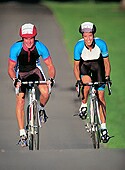Head Injuries All Too Common in Summer Play
But proper sports gear and preparation can prevent unnecessary accidents, experts say,
|
E-mail this article
Subscribe to news
Printer friendly version
|

(SOURCE: American Association of Neurological Surgeons, June 2008, news release)
SUNDAY, June 22 (HealthDay News) -- A few simple safety precautions can greatly reduce the risk of serious head, spinal or other types of injuries while doing summer sports and recreational activities, says the American Association of Neurological Surgeons (AANS).
There were about 319,000 sports-related head injuries treated in U.S. hospital emergency rooms in 2006, an increase of 10,000 injuries from 2005, according to U.S. Consumer Product Safety Commission statistics.
The top 10 causes of sports and recreation-related head injuries in 2006 were:
- Cycling -- 65,319.
- Football -- 34,638.
- Powered recreational vehicles (ATVs, dune buggies, go-carts, mini bikes) -- 28,585.
- Basketball -- 25,788.
- Baseball and softball -- 23,125.
- Water sports (diving, scuba diving, surfing, swimming, water polo, water skiing) -- 16,060.
- Skateboards/scooters -- 15,978.
- Soccer -- 15,208.
- Fitness/exercise (including at health clubs) -- 11,895.
- Horseback riding -- 9,260.
Here are some head and spinal injury prevention tips:
- Buy and always use helmets or protective head gear approved for specific sports.
- Wear appropriate clothing for the sport.
- Don't participate in sports when you're very tired or ill.
- Discard and replace damaged sporting equipment or protective gear.
- When playing baseball, never slide head-first into a base.
- When cycling, skateboarding, and rollerblading, obey all traffic signals, be aware of drivers, and avoid uneven or unpaved surfaces.
- Younger children should be supervised at all times and should not be allowed to use sporting equipment or play sports unsuitable for their age. Don't let young children use playgrounds located on hard surfaces.
- Perform regular safety checks of sports fields, playgrounds and equipment.
- Don't dive into water less than nine feet deep or in above-ground pools. Check the depth and check for debris in the water before diving.
- Follow all rules and warning signs at water parks, swimming pools, and public beaches.
- Football players should receive adequate preconditioning and strengthening of the head and neck muscles.
- Proper football blocking and tackling techniques must be taught and followed.
More information
The U.S. Food and Drug Administration has more summer safety tips.
Copyright © 2008 ScoutNews, LLC. All rights reserved. 
HealthDayNews articles are derived from various sources and do not reflect federal policy. healthfinder.gov does not endorse opinions, products, or services that may appear in news stories. For more information on health topics in the news, visit the healthfinder.gov health library.
|